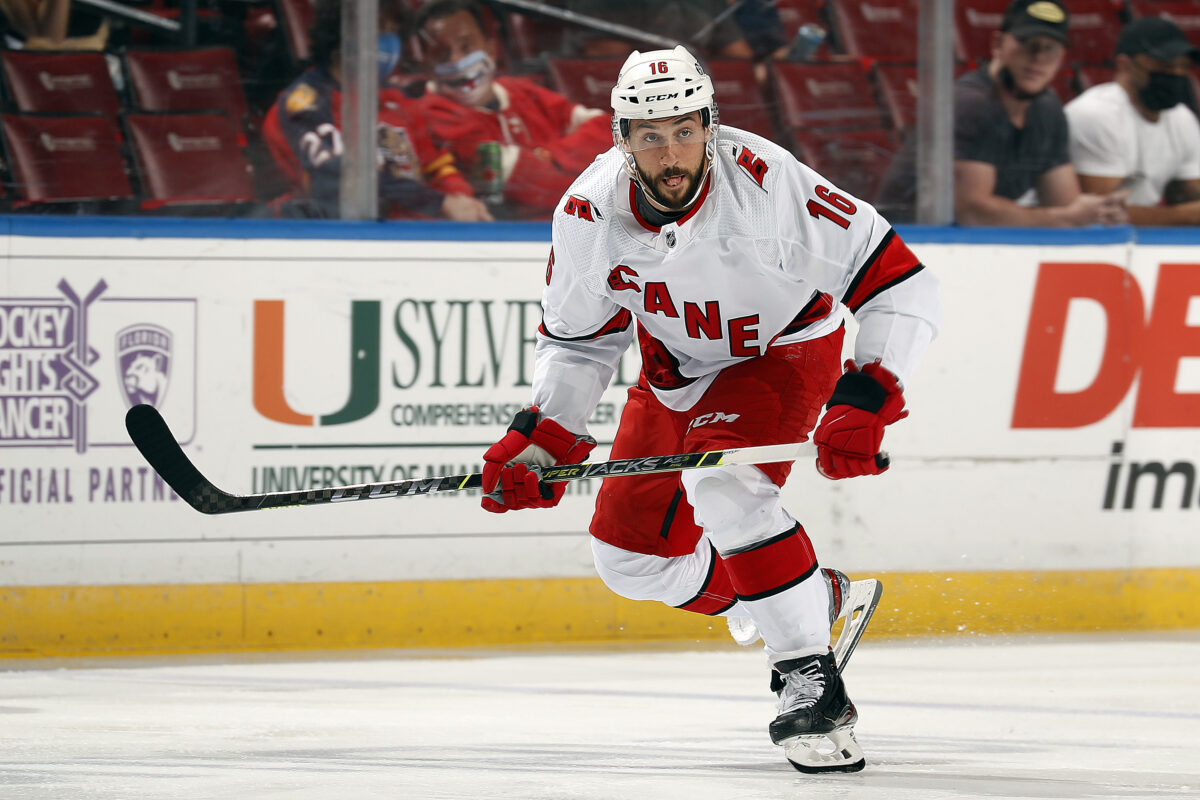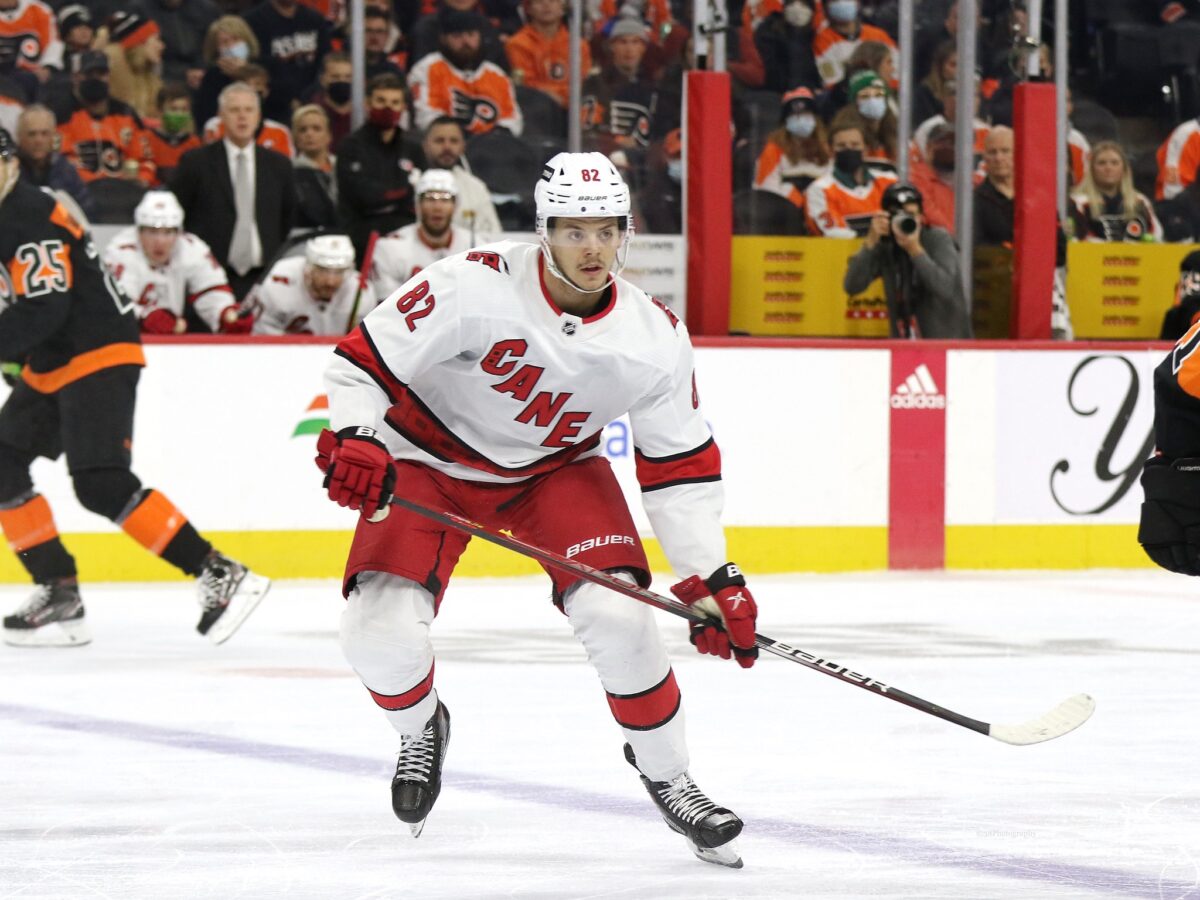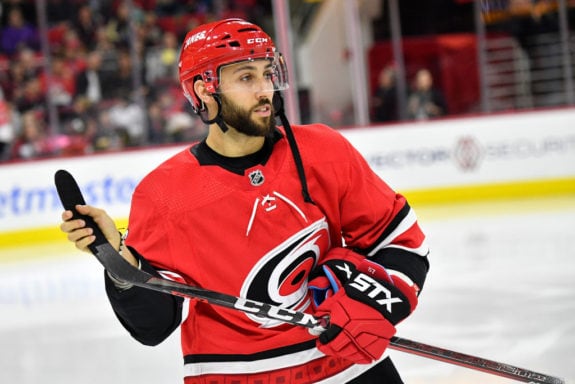Since coming to the Carolina Hurricanes via a trade with the Florida Panthers back in February of 2020, Vincent Trocheck has emerged as a key piece of the team’s identity. He’s slotted in exclusively as the second-line center since his arrival, which pushed down Jordan Staal to his rightful position on the third line – which has, in turn, been a key to his resurgence. With Sebastian Aho centering the top line, this trio has given the team one of the strongest center-ice groupings in the NHL.

Despite the success, many factors go into the business side of things in this league — and that’s where things begin to complicate surrounding Trocheck. He’s set to be an unrestricted free agent on July 1, 2022, and will be 29 when his next contract kicks in. The Dougie Hamilton negotiations this past summer showed that the Hurricanes aren’t particularly interested in committed big-money contracts to aging players. With Troheck’s injury history and style of play, it’s difficult to see the team breaking the trend for him.
Trocheck’s Overall Impact
Even though it currently seems like a long shot that Trocheck will get the kind of deal he wants in Carolina, it’s important to note how important he is to the current make-up of the team’s roster and how that could factor in upcoming negotiations. He’s been a seamless fit in his role thus far — a role that the Hurricanes had been searching for nearly a decade to fill. You can argue that his stability as the second-line center has also stabilized the entire depth chart at the position and has brought out the best in other players (like Staal).
Things get even more complicated when you consider the type of production the team will need to replace, should they move on from him. Since joining the team, he’s posted 61 points across 77 games — and has developed some legitimate chemistry with youngsters like Martin Necas.
Related: Panthers Made Horrible Mistake With Trocheck Trade
The fact that head coach Rod Brind’Amour also trusts him enough to deploy him in all situations really needs to be considered. He averages well over three minutes per game on the power play, and he’s one of the team’s most relied upon forwards in ice-time per game (17:06). He also features regularly on the penalty kill and has had fantastic results — in 23 games, the Hurricanes have not surrendered a single shorthanded goal with Trocheck on the ice. Considering he averages 1:24 per game on that unit, his suppression rates are very impressive, and they speak volumes as to why Brind’Amour leans on him so often.
Kotkaniemi Among Many Internal Replacement Options
When you’re talking about potentially replacing a player who’s such a vital part of a team’s identity, you better be damn sure that there are adequate options to fill that role in place. Thanks to first-class drafting and development by the Hurricanes’ organization, they’ve amassed numerous potential options that may be a fit for that role in a year from now. Of course, it must be remembered that none of what they have internally has proven they can effectively play second-line minutes in the NHL. The team would be taking the “trial by fire” approach — which has both upsides and downsides.

The most logical option as far as replacements go – as of this moment – would be Jesperi Kotkaniemi, who’s begun settling in quite nicely in Raleigh. The team had intended to move him to the wing as he transitioned into the system, but mediocre results in the process have seen him move back to center. He’s been much more effective in that role — which is expected — as center is his natural position, and that’s where he played with the Montreal Canadiens. His production through 23 games is a down-grade from that of Trocheck’s, but he’s on pace to score 21 goals and has played exclusively in a bottom-six slot.
With Kotkaniemi, you’d imagine that elevated minutes and playing alongside more skilled linemates would translate to an uptick in production, which is certainly plausible. He’s far younger than Trocheck, he has room to grow and could theoretically have more upside if things go to plan. On the other hand, he’ll be drawing much tougher assignments and being allocated heavier minutes. There’s sure to be growing pains and a learning curve for him to adapt to a much-expanded role in the system, and he’ll have his work cut out for him to earn the same trust that Trocheck currently has.
The major question will be how comfortable the Hurricanes’ staff would be to go with a much more inexperienced option. Kotkaniemi is a huge dip from Trocheck in that regard, but the other potential options are even further down the chart. Jack Drury and Jamieson Rees are both top prospects who impressed in training camp and have had strong developmental seasons — but they’re both first-year pros and adapting to the rigors of men’s hockey. Ryan Suzuki is another young center with a bright future, but injuries continue to limit the acceleration of his development.
While all three of Rees, Drury, and Suzuki figure to be part of the Hurricanes’ future, it’s hard to sit here today and realistically pencil any of them in as a legitimate Trocheck replacement in less than a year from now. They’re all very talented and could turn the switch on at some point. Still, it’s difficult to imagine the team being comfortable with such inexperienced options in a major role — especially if they plan to be a Stanley Cup contender again next season. For now, Kotkaniemi would be the clubhouse leader. He has the skill, experience, and a comparable style to Trocheck — he has all the tools, but can he put them all together?
Trocheck Likely to Cash In
In the world of pro sports, money always does the talking — and that’s what it’ll boil down to for Trocheck. He’ll be 29 years old when his next contract kicks in, so it’s fair to say that this could be his final major opportunity to cash in on a long-term deal. His production through 23 games has him on pace for a 57-point season, which is a solid output from a second-line center and even more valuable when considering his relentless forechecking and penalty-kill success.

Safe to say, I think there’d be a rather large market for Trocheck should he go to free agency. Players of his caliber don’t become available all too often, and NHL teams have shown a commitment to building down the middle. I’d assume that his strong scoring pace, combined with the team’s reluctance to commit long-term contracts to aging players, makes it a very likely possibility that he’ll head to the open market in the summer of 2022. If he continues to produce at this rate, I’d imagine that he’ll price himself out of the Canes’ comfort zone – similar to the Hamilton contract.
Recapping the Hurricanes’ Options
The good news with this negotiation is that the ball figures to be in the Hurricanes’ court. They’ve emerged into a legitimate Stanley Cup contender and are becoming a destination place to play — in a great city with a great fanbase and organization. If Trocheck’s contract demands are reasonable and the team is willing to commit to that, there’s a lot of reason for optimism that he’d choose to re-sign in Carolina rather than start fresh elsewhere. He’s been a seamless fit on the ice, he seems to be a popular teammate, and the fanbase has grown attached to him.
On the other hand, should Trocheck opt to head to the market and sign elsewhere, the Hurricanes would obviously be OK with the move, and at that point, and would have their replacement options in mind. They could opt to use that freed-up cap space to bring in a replacement from outside the organization, or they could turn internally towards their youth and roll with Kotkaniemi or a Drury/Rees type — if they mature. Regardless, General Manager Don Waddell and Co. have earned the benefit of the doubt that they’ll do what’s best for the team with the long-term vision in mind and continue to have this group on the right path moving forward.